Homemade elderberry syrup or cordial makes not only a delicious & refreshing drink, fantastic drizzle for desserts but also natural & immunity-boosting cold remedy! Simple to make at home and virtually free, this recipe is a must to try!
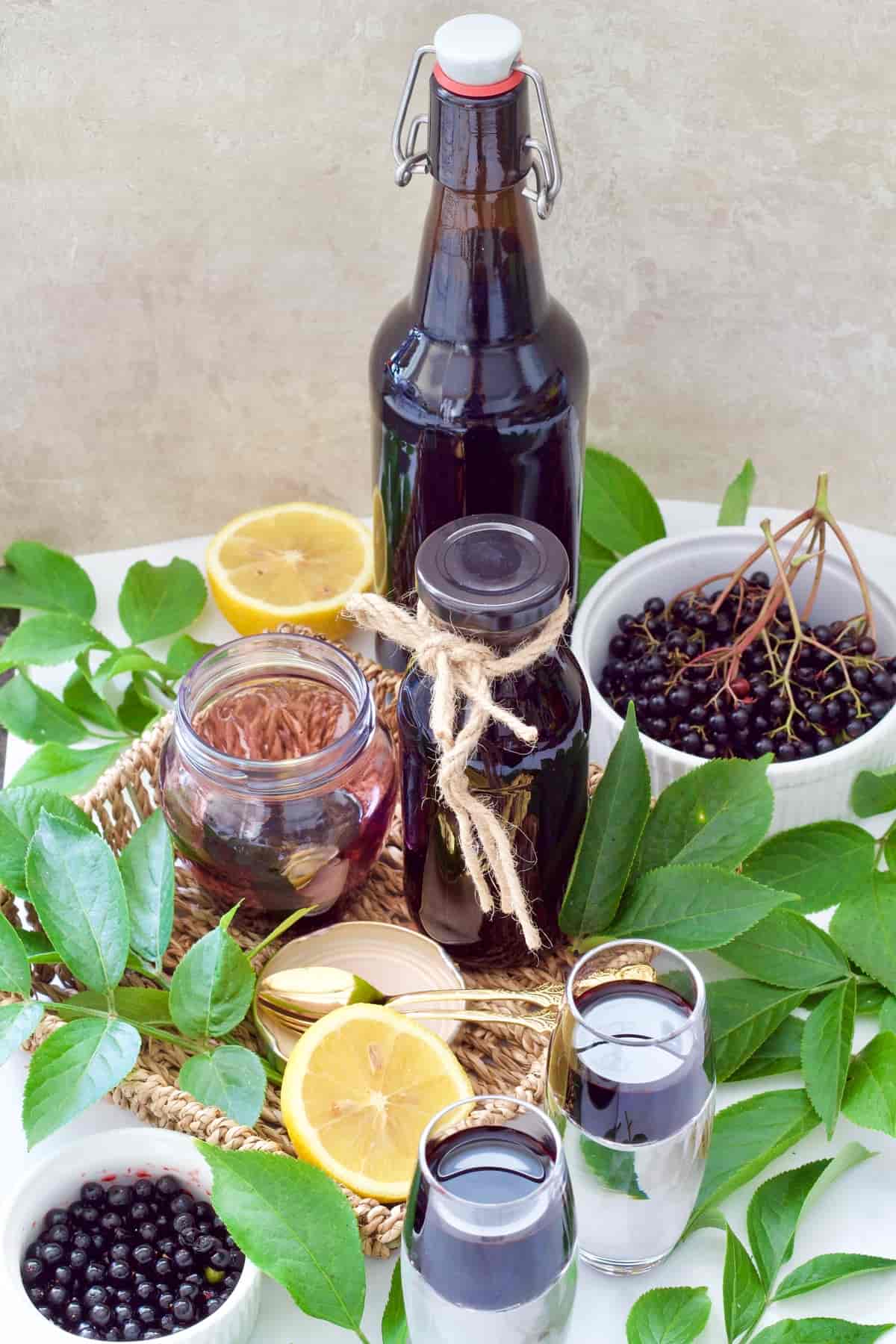
I'm an occasional forager (and a lazy one too) but when you have couple of impressive elder plants full of juicy and ripe elderberries right on your doorstep, it would be rude not to do something with all that gorgeous fruit they give you .
After a little research I decided on quick and easy elderberry recipe for Elderberry Syrup or cordial if you wish.
It's like bottling the summer to enjoy when the weather is cold and damp and you could use a little bit of pick me up. Elderberry syrup is perfect for that!
If you like making your own syrups/cordials make sure to check out my Elderflower Syrup and Rhubarb Cordial recipes next!
Jump to:
- What are elderberries?
- ✔️ Why should you make it?
- 🥘 Ingredients
- 🍽 Equipment
- 💭 Top Tips
- 🥡 Storing and Freezing Elderberry Syrup
- 📖 How to sterilise glass bottles and jars?
- 🍴 Serving Suggestions
- ❓ FAQs
- 🔪 How to make Elderberry Syrup (Elderberry Cordial)?
- 😋 More delicious recipes for you to try!
- 📋 Recipe
- 💬 Comments
What are elderberries?
Elderberries are berries from the Sambucus or Elder Tree, same one that in the spring produces gorgeous elderflowers.
These little berries are known to be high in Vitamin C and antioxidants and supposedly really good at helping fight common cold and flu as well as boosting immunity.
You might want to have a quick glance at the abstract from the study on elderberry syrup efficacy and safety conducted in Norway during winter 1999-2000, the results (even though it was a small scale study) are really interesting and quite encouraging.
Please note that I am not a nutritionist and the main reason I make elderberry syrup is for culinary and not health purposes.
One interesting fact when it comes to elderberries is that they should not be eaten raw as they contain toxins that can make you very ill. Cooked, however, and processed into syrups, jellies etc. they're perfectly safe.
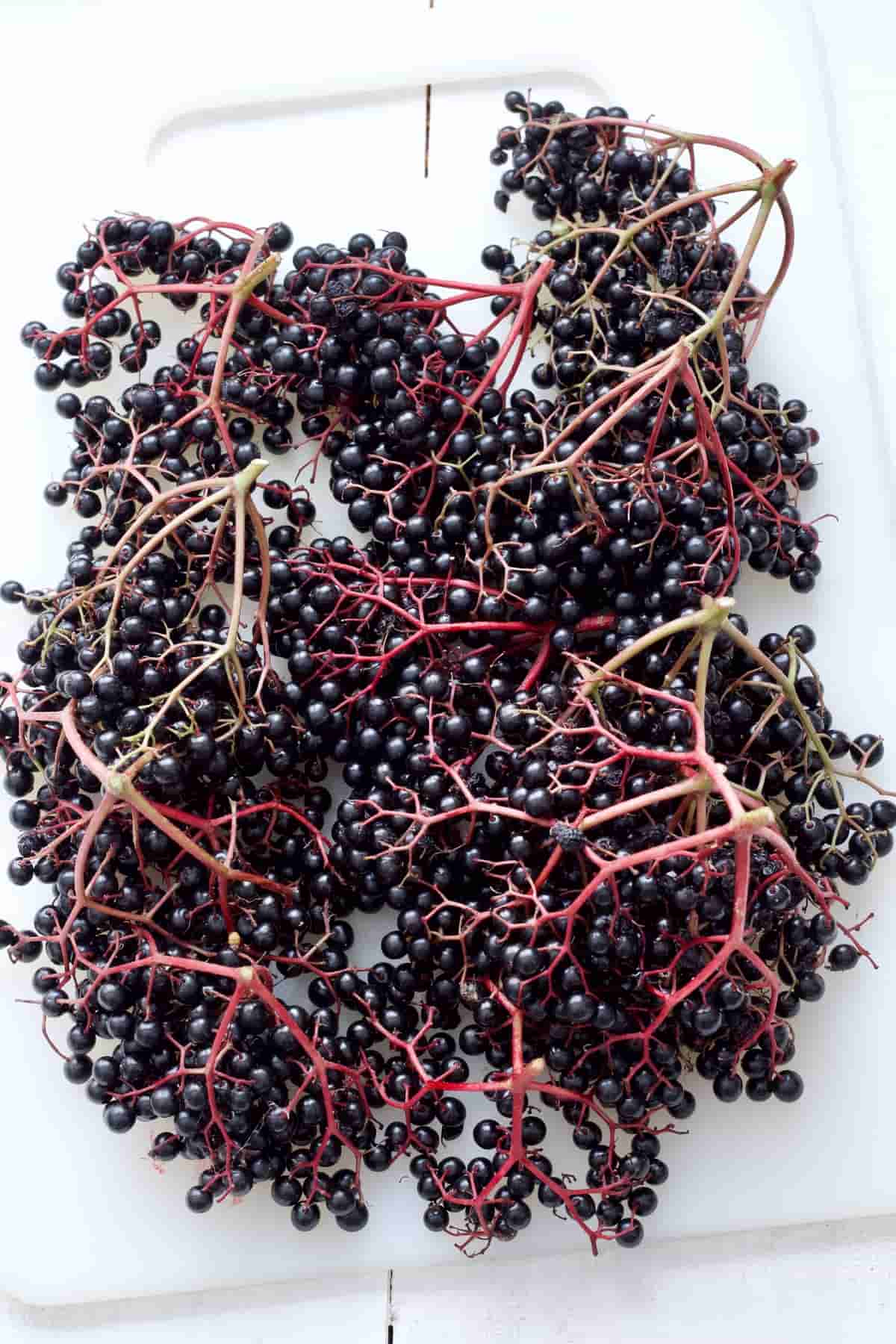
✔️ Why should you make it?
- It makes delicious and refreshing drink or sweet and flavourful syrup for pancakes, waffles and other breakfasts and desserts
- Easy to make and virtually free (if you forage your own elderberries)
- High in vitamin C and antioxidants
- It is thought to be an immunity boosting and cold fighting elixir
- Simple, homemade cordial with long shelf-life
- Taste of summer in the depths of winter
- Vegan
🥘 Ingredients
Elderberries - The absolute star of the show. Make sure to use them as soon as they're picked, don't let them sit around.
Sugar - Any sugar of your choice will do here, granulated, white or golden caster sugar even brown.
Typical ratio of sugar to elderberry juice is 500g (1.1lb or 17.6oz) sugar for every 1 litre (4.2 cups) of juice you get after straining cooked elderberries. You can of course adjust the amount of sugar according to your preferences but do bare in mind that elderberries are quite bitter plus less sugar will affect the shelf-life of your syrup
Lemon Juice - Natural preservative and flavour enhancer it cuts through all the sweetness of the syrup and naturally extends its shelf-life.
I like to add juice of one large lemon for every litre of elderberry juice.
Additional Flavourings - Feel free to add some extra flavours if you want to. I went for some fresh ginger but any woody spices like star anise, allspice, cinnamon sticks would work well here. Some fresh orange slices could add nice flavour to the syrup too.
Citric Acid - If you wanted to increase shelf-life of your elderberry cordial, you could add some citric acid with or instead of lemon. On this occasion I went with lemon juice on its own, especially as elderberries (similar to citrus fruits) contain lots of naturally occurring citric acid anyway.
However, If you wanted to use citric acid here (perhaps instead of lemon juice) I would recommend ½ teaspoon per 500ml/2.1 cup of syrup.
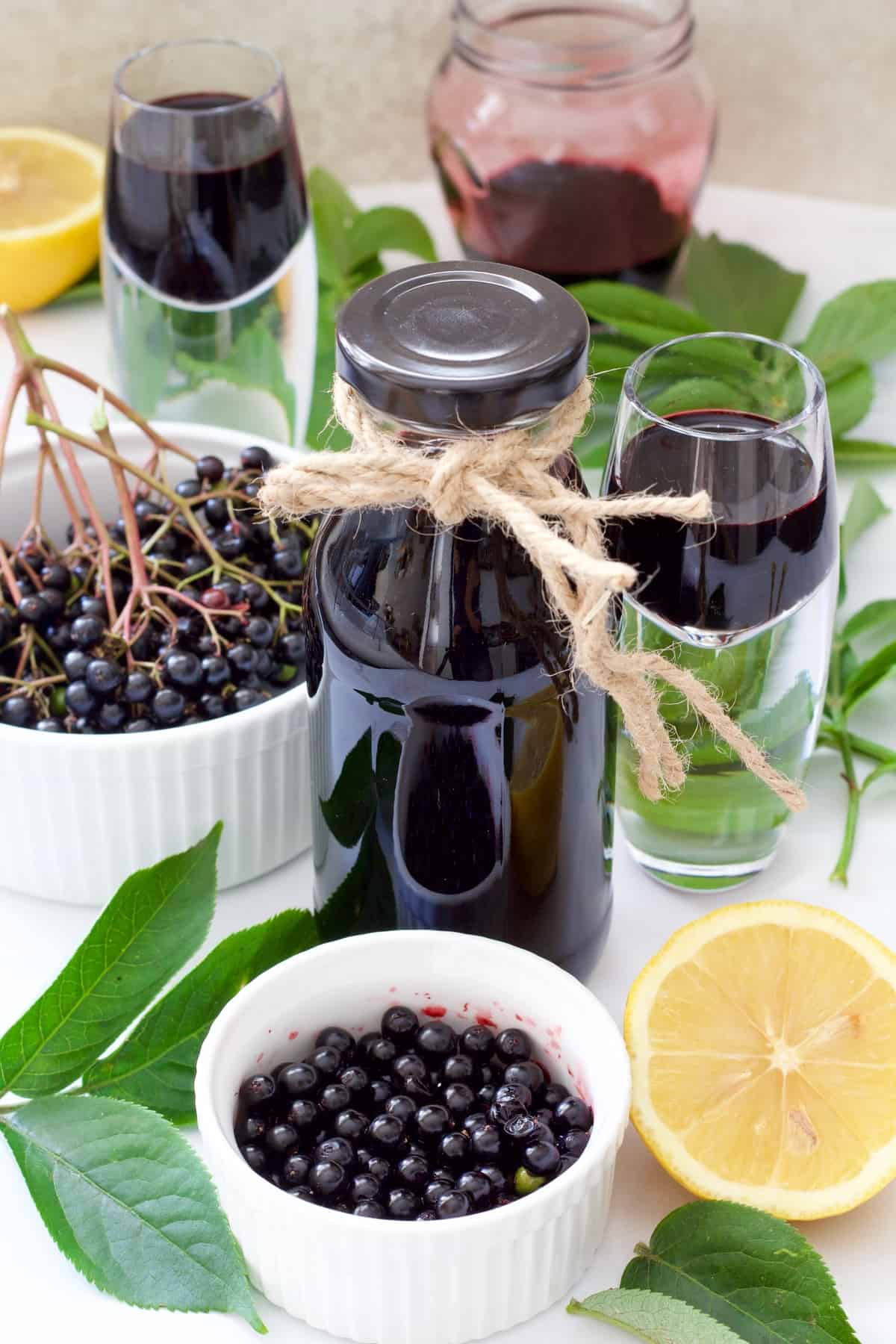
🍽 Equipment
Large Bowl - Great for washing elderberries. You'll be surprised how many little bugs and spiders hide in these berry bunches when you pick them.
Medium to large saucepan (depending on the amount of syrup you're making) for cooking the elderberries.
Potato Masher - Super helpful for mashing and squashing the elderberries as they cook.
Sieve - Fine sieve is important here as you will need to strain the elderberries once cooked.
Muslin Cloth - Not essential if you've got a really fine sieve but I use it just to make sure that no pulp gets through into my syrup at all.
Funnel - Makes bottling the syrup so much easier.
Glass Bottles - I use the ones with swing tops my hubby bought for making his home brew, love them.
💭 Top Tips
- Make sure you wear some old cloths you don't mind getting few stains on as elderberries will get you dirty even if you think you're being really careful.
- Use fork to take elderberries off their little bunches. Simply run the fork down the stalk and they should come off (they will splatter a bit so wear those old clothes or at least an apron).
- You could freeze elderberry bunches first which will make taking berries off a real doddle.
- Wash elderberries really well as there are tons of little insects living on them. I find that immersing them in a bowl full of water makes the insects come up to the surface. Drain and repeat for super clean berries.
- Make sure to pick and discard any green elderberries.
- Use potato masher for getting extra juice out of elderberries as they cook.
- If you'd like for your syrup to last without spoiling, make sure to sterilise bottles and jars you will use to store it in.
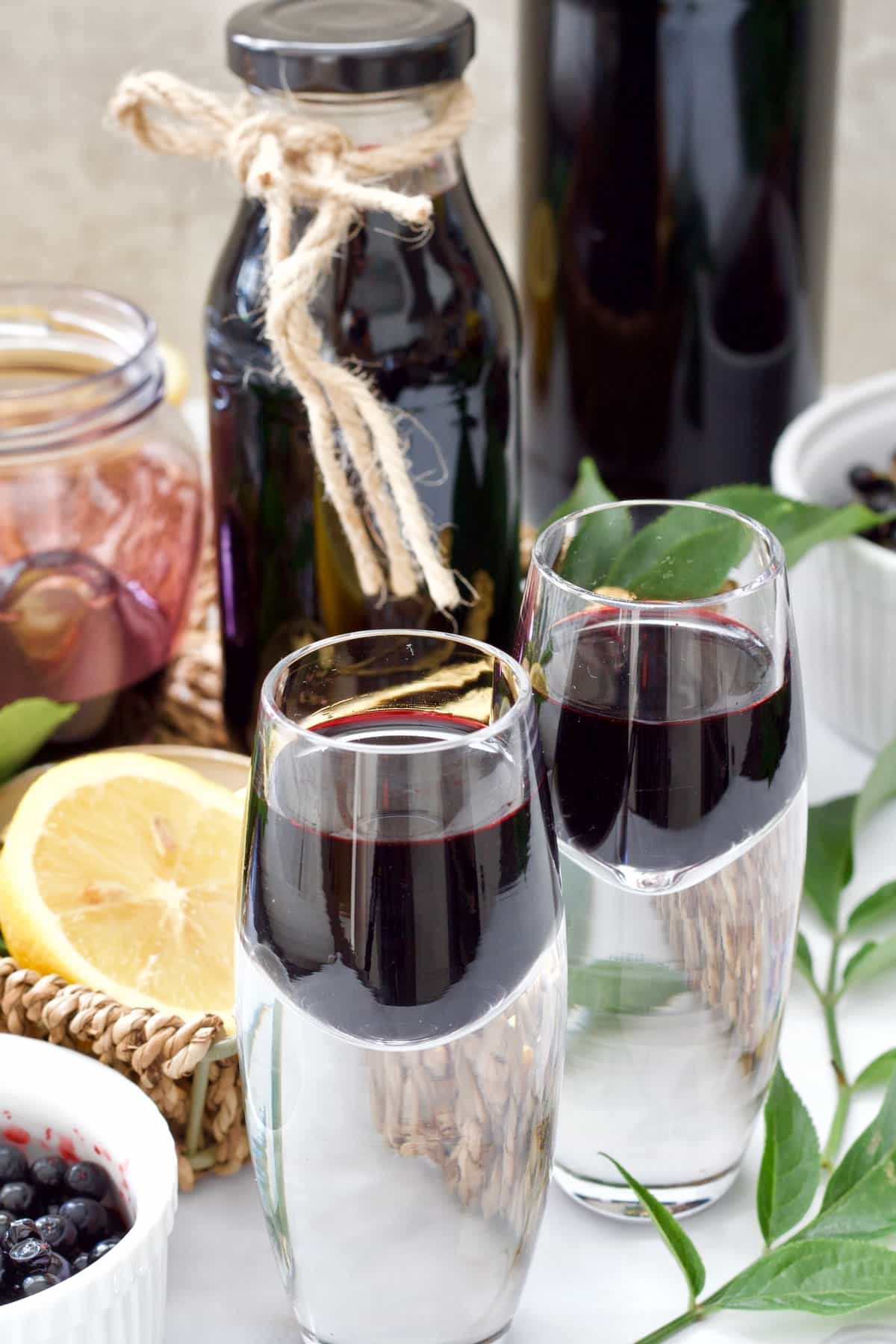
🥡 Storing and Freezing Elderberry Syrup
Elderberry syrup is best stored in a cool place away from direct sunlight or refrigerated for up to a year or even longer. Once opened store in the fridge.
Using well sterilised bottles will prolong its shelf-life.
Alternatively, you can always freeze it in small portions (ice cube trays are great for that) which will make it easy to take out and defrost as much or as little as you need.
📖 How to sterilise glass bottles and jars?
In the oven
Wash them thoroughly in hot, soapy water and give them a good rinse (preferably in hot water as well).
If your bottles/jars have rubber seals, make sure to take these off before you place the bottles in the oven. You can sterilise these separately by putting then in the heat proof bowl and covering with freshly boiled water for 10 minutes or so.
Preheat the oven to 160C/320F/Gas Mark 3. Place all your opened bottles/jars on the clean baking tray and "bake" in preheated oven for 10-15 min until dry. You might have to rearrange the racks in your oven to be able to fit your tray with bottles.
Metal jar lids can go into the oven after thorough washing together with bottles and jars.
Once the time is up, take the bottles/jars out of the oven and fill them with elderberry syrup as soon as possible.
In the dishwasher
Alternatively, you can sterilise your bottles/jars in the dishwasher by running them on the hot cycle.
Make sure not to put any dirty dishes in with the glass items you want to sterilise.
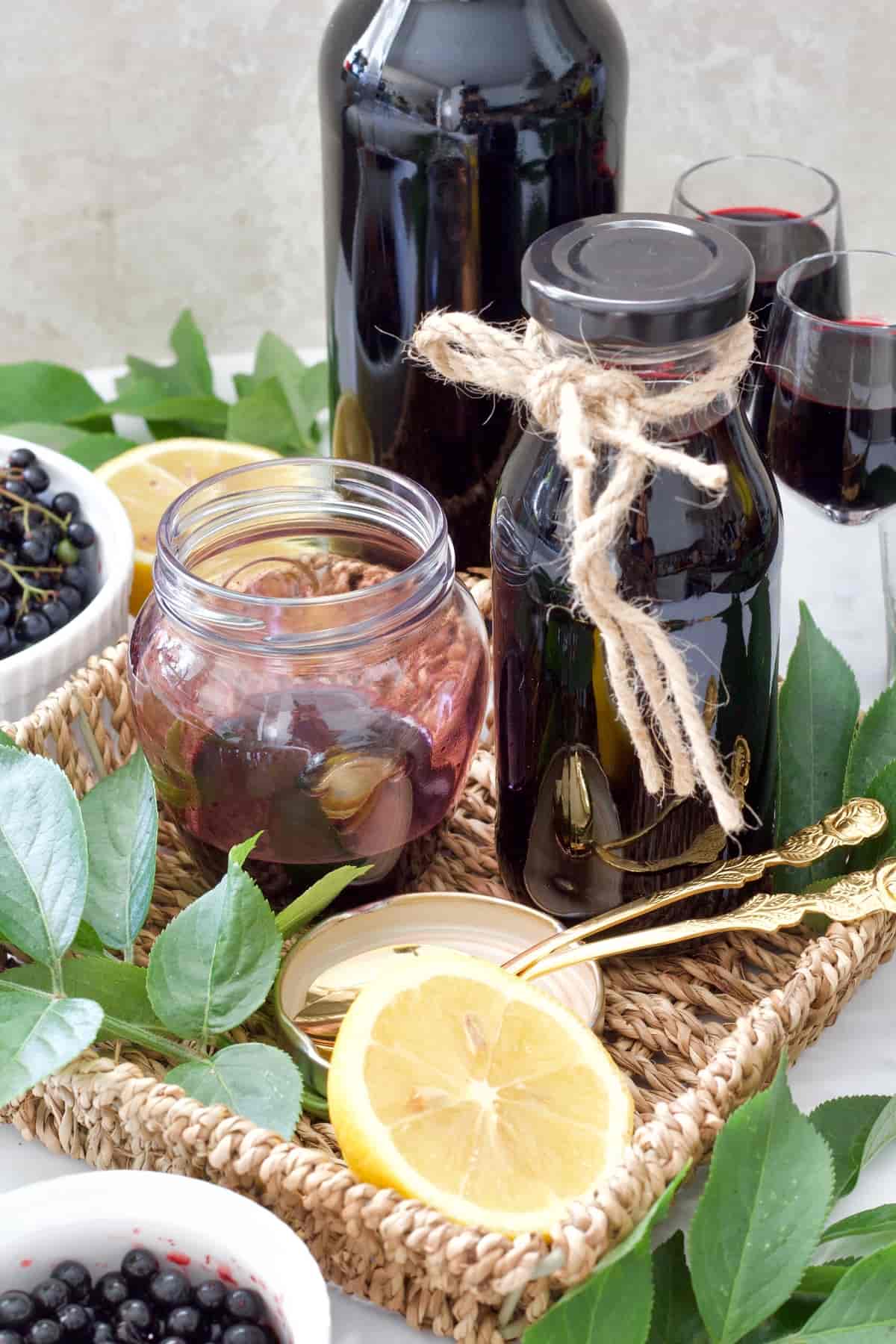
🍴 Serving Suggestions
Elderberry syrup or cordial can be taken neat (tablespoon at a time) for that extra immunity boost or when you're feeling under the weather.
We like to dilute it as we would any cordial, either with still or sparkling water and perhaps addition of extra lemon and some fresh mint.
I love adding it to hot water or tea to make warming and comforting elixir. Or try it with some hot water and brandy or whisky - hot toddy with a twist! It would go really well added to some mulled wine too.
Have I mentioned cocktails? Try it with Prosecco, Cava or Champagne for a twist on Kir Royale or make elderberry flavoured gin and tonic!
Elderberry syrup makes fantastic, sticky drizzle to pour over pancakes, waffles, or to have with yogurt and granola or your favourite ice cream.
To make it wonderfully thick and sticky simply pour it into a small saucepan and let it reduce over low heat until desired consistency! Super delicious!
❓ FAQs
In the UK elderberries are in season from late August to mid October.
They both come come from the same plant - elder and both have been used widely in food preparations. Look out for elderflowers in the spring and elderberries in late summer, early autumn.
If you'd like to ensure that your syrup/cordial last well without spoiling I would highly recommend sterilising your bottles. (See: How to sterilise glass bottles and jars?)
Yes you can. Out of season you can easily use dried elderberries to make the syrup. Use half the amount of dried elderberries (in weight) for this recipe and adjust water to exactly double the amount of dried berries (in volume).
This is the exact amount of fresh elderberries I've used in this recipe and it yielded me around 1.3 ltr (5.5 cups) of elderberry syrup.
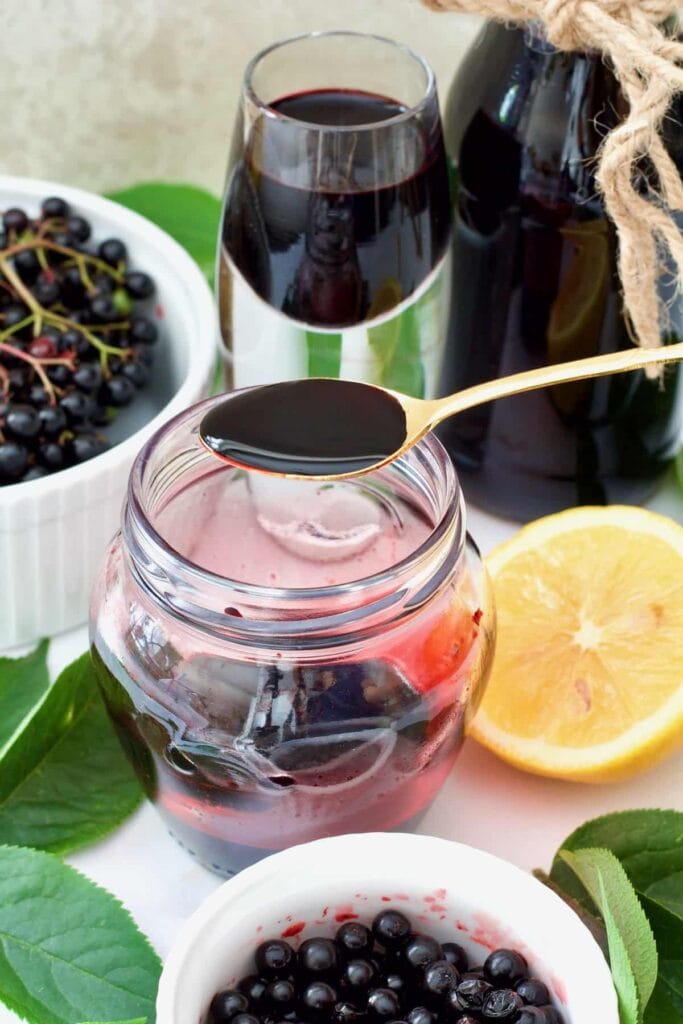
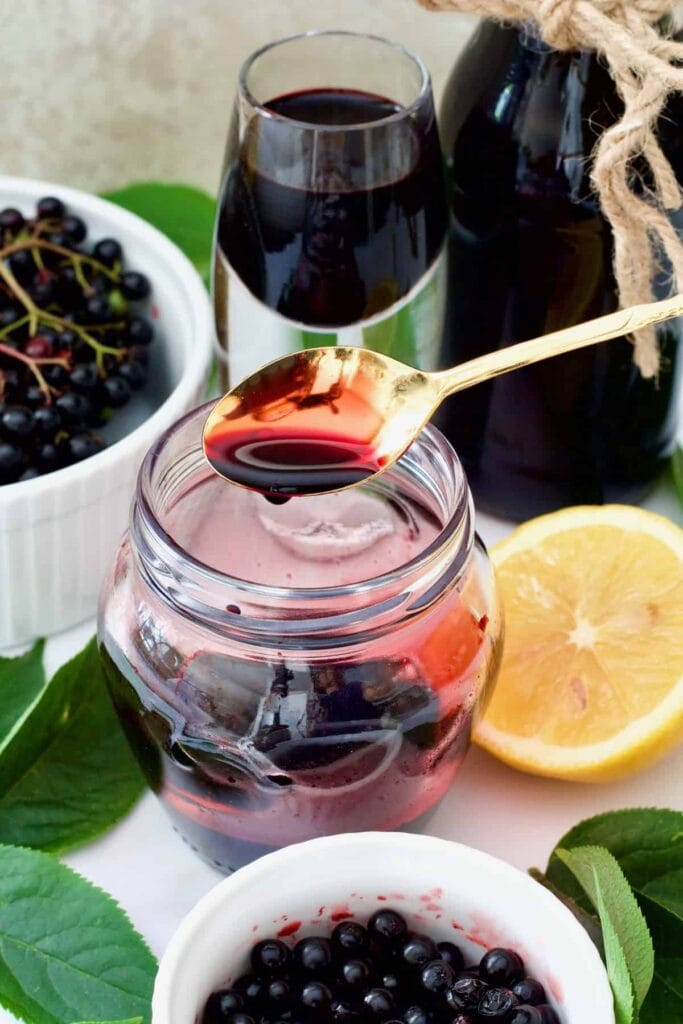
🔪 How to make Elderberry Syrup (Elderberry Cordial)?
Ingredient quantities & detailed instructions to be found in recipe card at the bottom of the post.
One: Start with taking elderberries off their bunches. I find a simple fork does the job well.
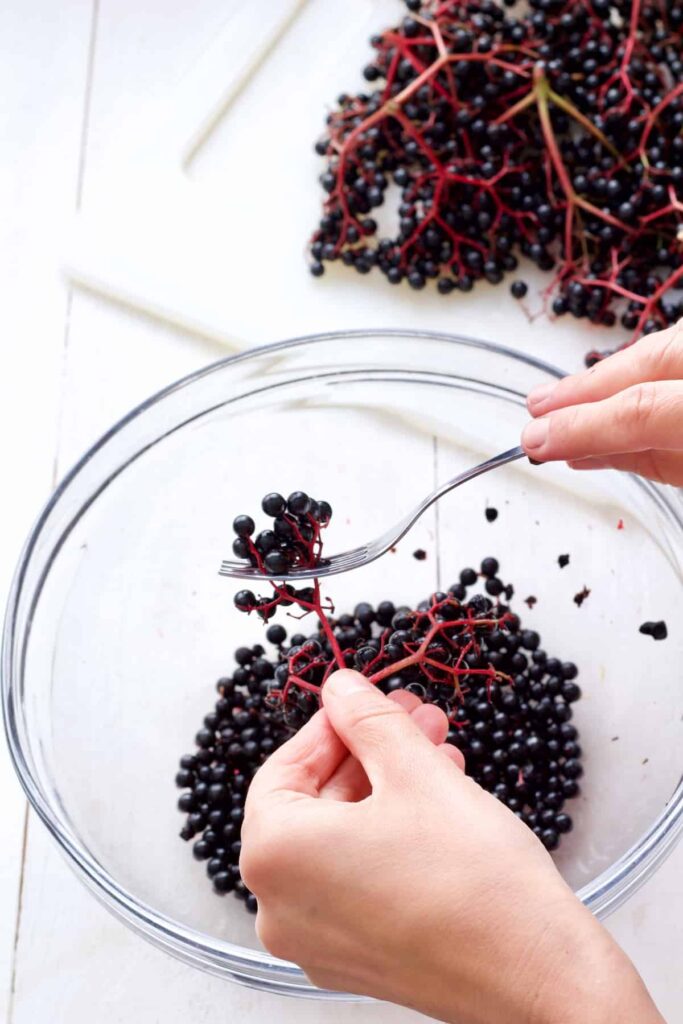
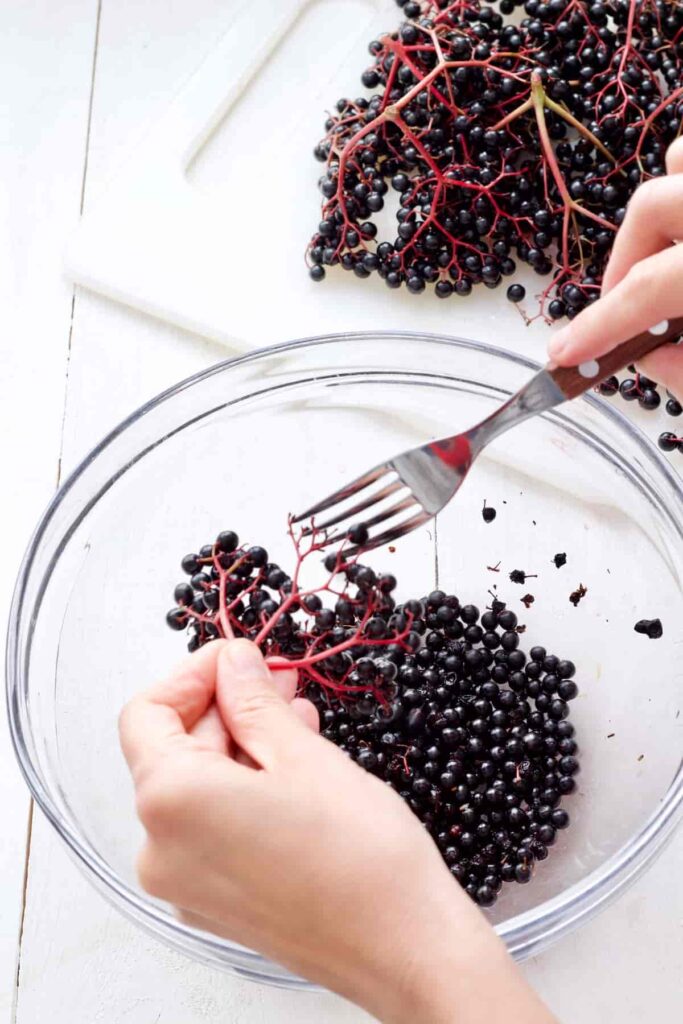
Two: Wash elderberries well, picking as many little leftover stalk bits as possible and discarding any green berries.
Three: Put clean elderberries in a saucepan and pour over some cold water (just to cover them).
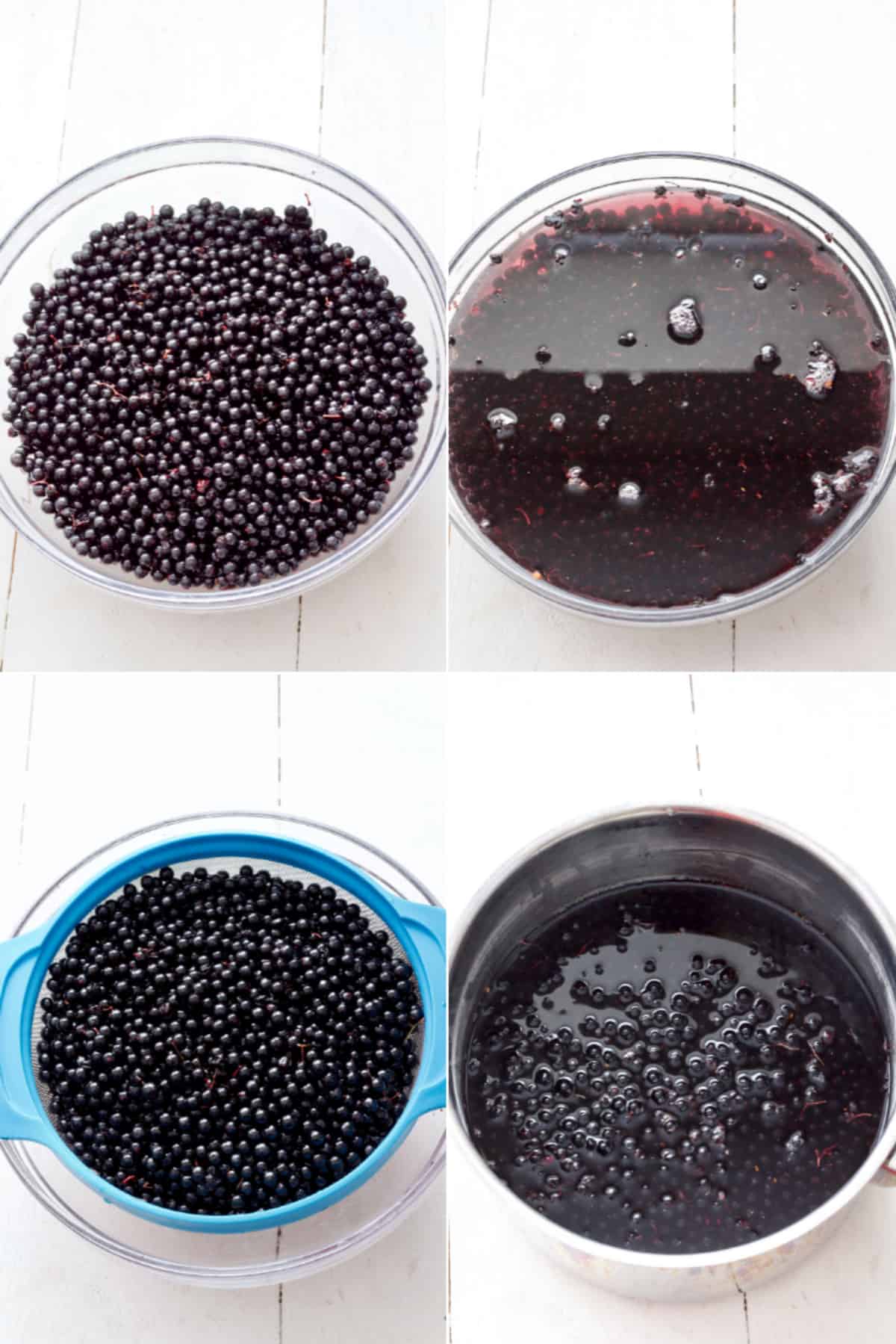
Four: Add any extra flavourings of choice e.g. grated ginger, orange slices, star anise, cinnamon stick, allspice etc. and give it all a good mix.
Five: Let elderberry mixture come to boil, turn the heat down to low and simmer for approx. 20 minutes.
Six: As the mixture simmers, squash the berries well couple of times with potato masher to help them release their juices.
Seven: Strain the mixture into a large bowl through a fine sieve or sieve lined with a piece of muslin/cheesecloth. You might need to give it a squeeze to get as much juice as possible out of the berries. Discard the pulp.
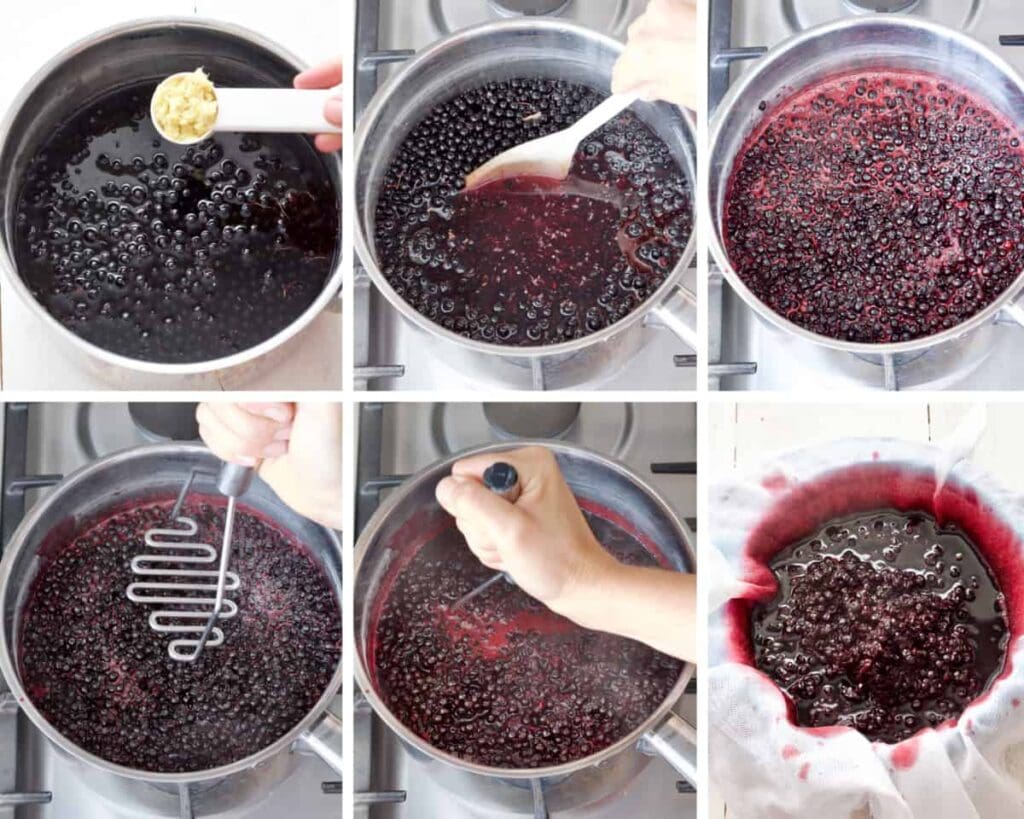
Eight: Measure how much juice you've got to establish how much both sugar and lemon juice to add.
Nine: Pour the juice into another saucepan, add sugar and lemon juice and bring to a very light simmer.
Ten: Simmer on low heat for 10 minutes until all the sugar has dissolved, take it off the heat.
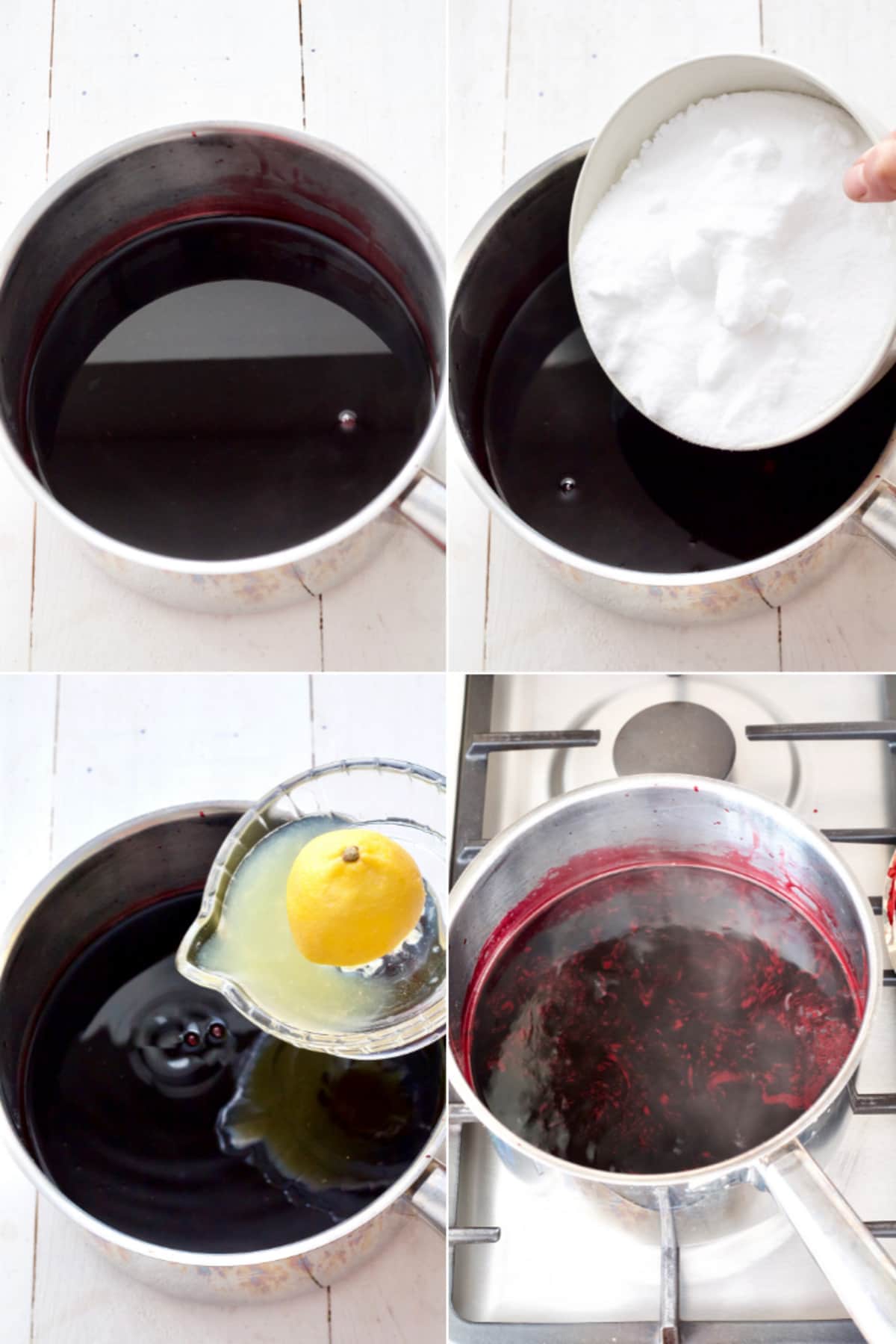
Eleven: Pour hot elderberry juice into sterilised bottles/jars, let them cool and store in a cool place, away from direct sunlight.
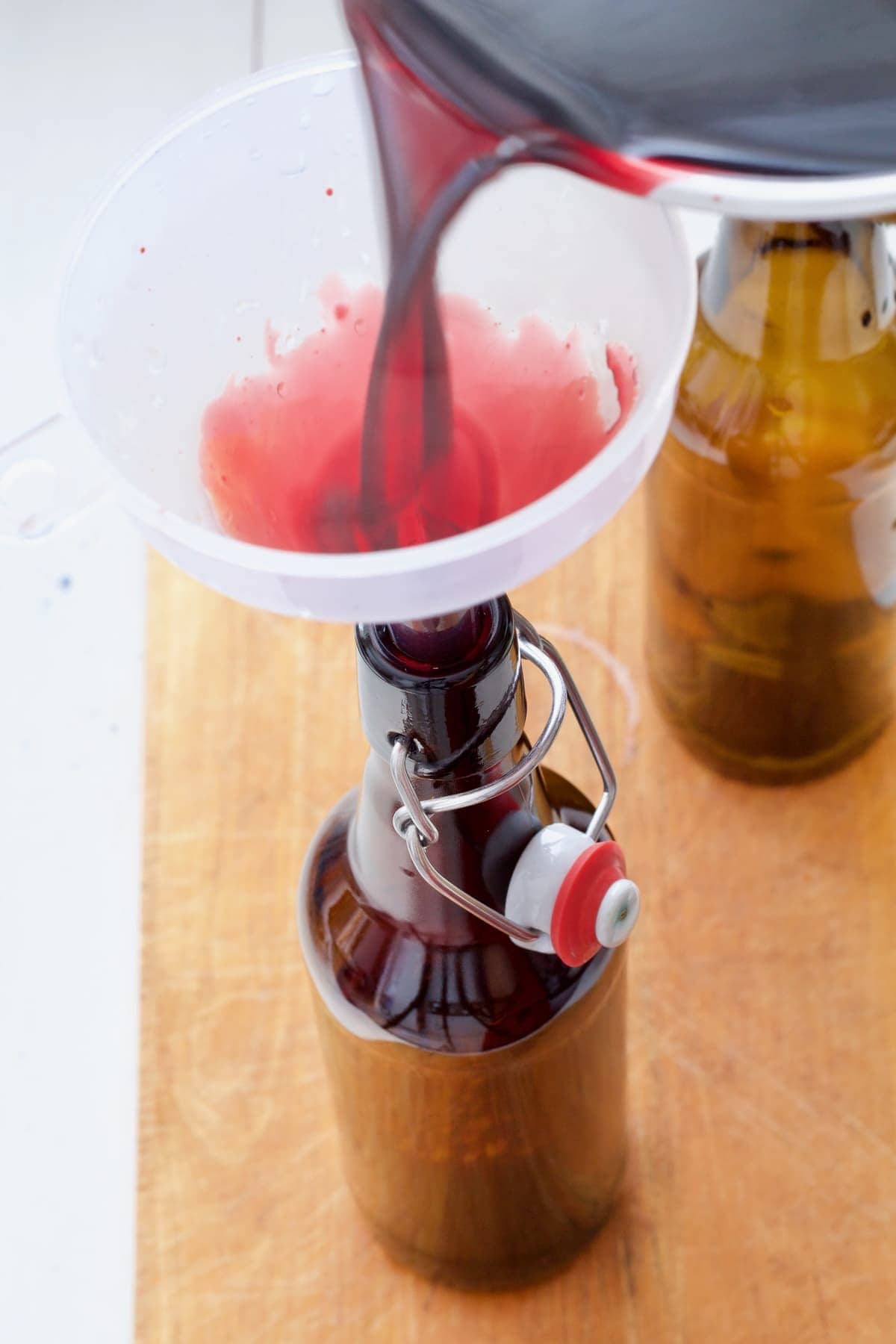
Have you tried my Elderberry Syrup recipe?
Please consider giving it ⭐️⭐️⭐️⭐️⭐️ rating in recipe card below.
😋 More delicious recipes for you to try!
Easy Blackberry Jam (No Pectin)
Blackberry Vinegar
Orange Marmalade (with step-by step photos)
Plum Jam with Chocolate
How to make lemon curd
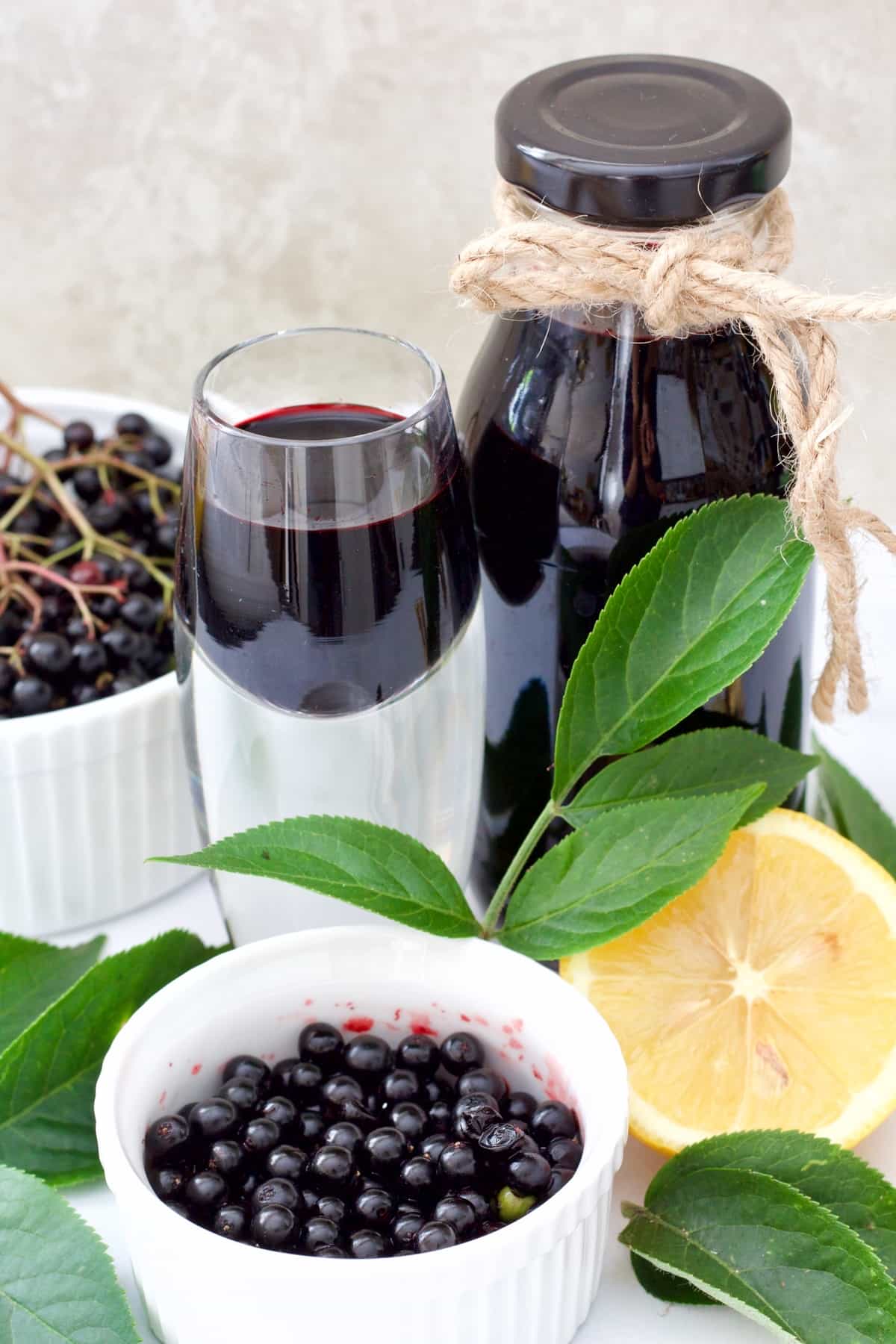
📋 Recipe
Homemade Elderberry Syrup (Elderberry Cordial)
Equipment
Ingredients
- 1 kg fresh elderberries washed and taken off the stalks
- 500 g sugar (granulated, caster, demerara, brown etc.) you will need 500g (1.1lb or 17.6oz) sugar for every 1 litre (4.2 cups) of strained juice
- lemon juice juice of half a lemon for every 500 ml (2.1 cups) of strained juice
- additional flavours and aromatics e.g. fresh ginger, orange slices or peel, star anise, allspice, cinnamon etc. These should be added at the initial stage when cooking elderberries
Instructions
- Start with taking elderberry off their bunches. I find a simple fork does the job well.
- Once off their stalks, wash berries really well in couple of changes of water, picking as many little leftover stalk bits as possible and discarding any green berries.
- Put clean elderberries in a saucepan and pour over some cold water (just to cover them).
- Add any extra flavourings of choice e.g. grated ginger, orange slices, star anise, cinnamon stick, allspice etc. and give it all a good mix.
- Let elderberry mixture come to boil, turn the heat down to low and simmer for approx. 20 minutes.
- As the mixture simmers, squash the berries couple of times with potato masher to help them release their juices.
- Strain the mixture into a large bowl through a fine sieve or sieve lined with a piece of muslin/cheesecloth. You might need to give it a squeeze to get as much juice as possible out of the berries. Discard the pulp.
- Measure how much juice you've got to establish how much both sugar and lemon juice to add. You will need 500g (1.1lb) sugar and juice of one lemon for every litre (4.2 cups) of elderberry juice you get after straining.
- Pour the juice into another saucepan, add sugar and lemon juice and bring to a very light simmer.
- Simmer on low heat for 10 minutes until all the sugar has dissolved, take it off the heat.
- Pour hot elderberry juice into sterilised bottles/jars, let them cool and store in a cool place, away from direct sunlight.
- Enjoy!
Notes
- Nutritional information is approximate and per 1 tablespoon of syrup prepared with 1kg of fresh elderberries and 500g of sugar. It should be treated as a rough guideline only.
- Elderberry syrup should be refrigerated or kept in a cool place away from direct sunlight. It should last a year or even longer. Once opened, keep refrigerated.
- Suitable for freezing.
- Elderberries stain so wear apron or some old clothes when making the syrup.
- Fork works really well for taking little berries off their bunches. You could freeze elderberry bunches first which will make taking berries off a real doddle.
- Wash elderberries really well as there are tons of little insects living on them. I find that immersing them in a bowl full of water makes the insects come up to the surface. Drain and repeat for super clean berries.
- Make sure to pick and discard any green elderberries.
- Use potato masher for getting extra juice out of elderberries as they cook.
- If you'd like for your syrup to last without spoiling, make sure to sterilise bottles and jars you will use to store it in.

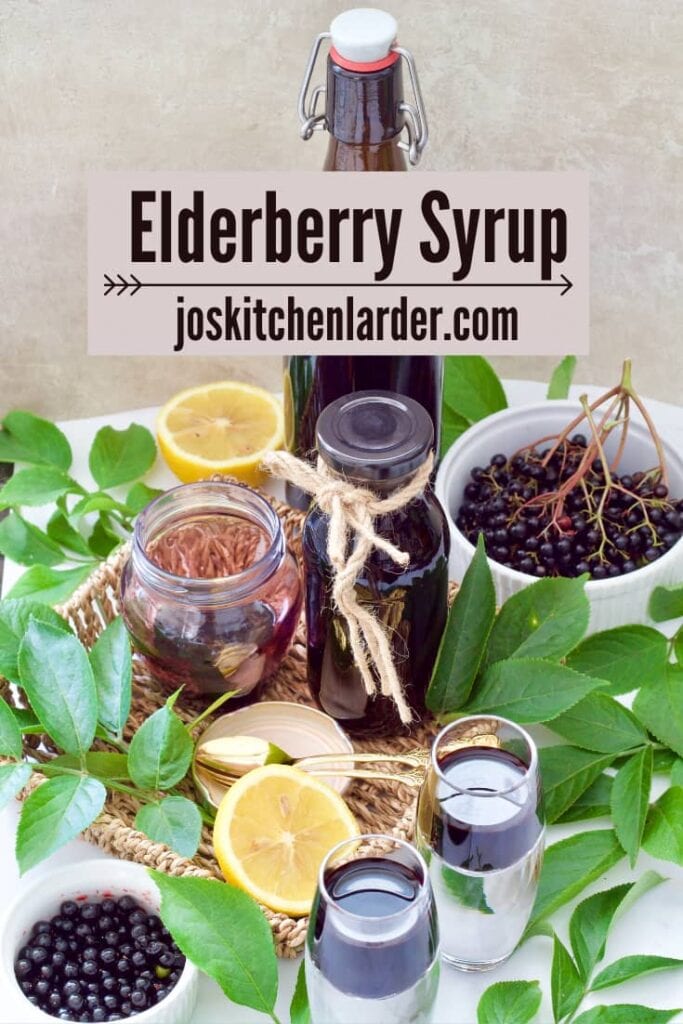
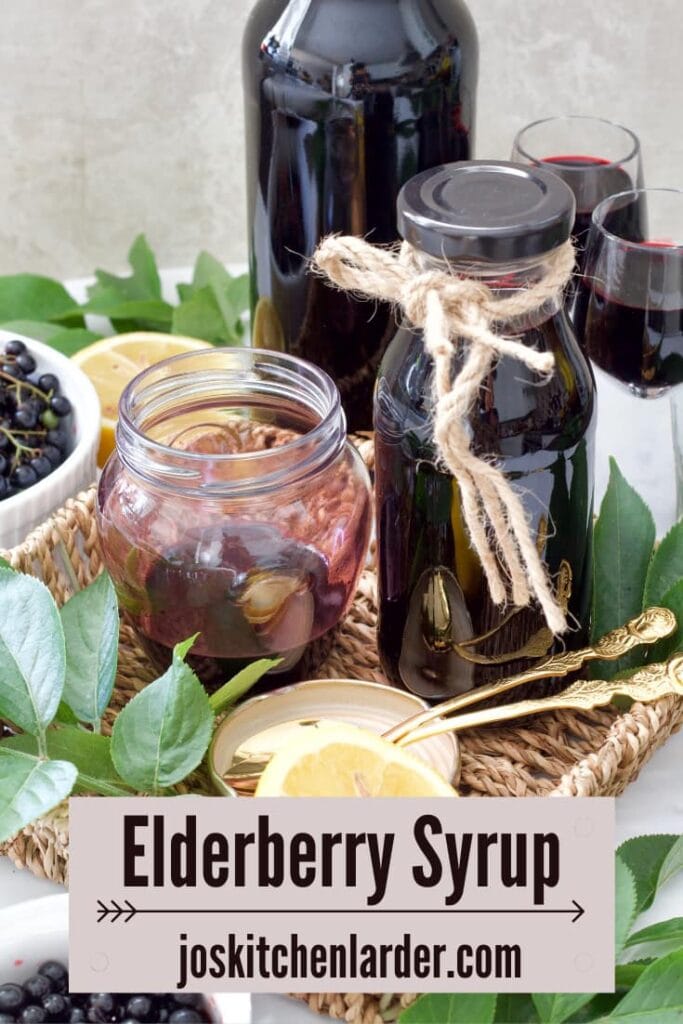
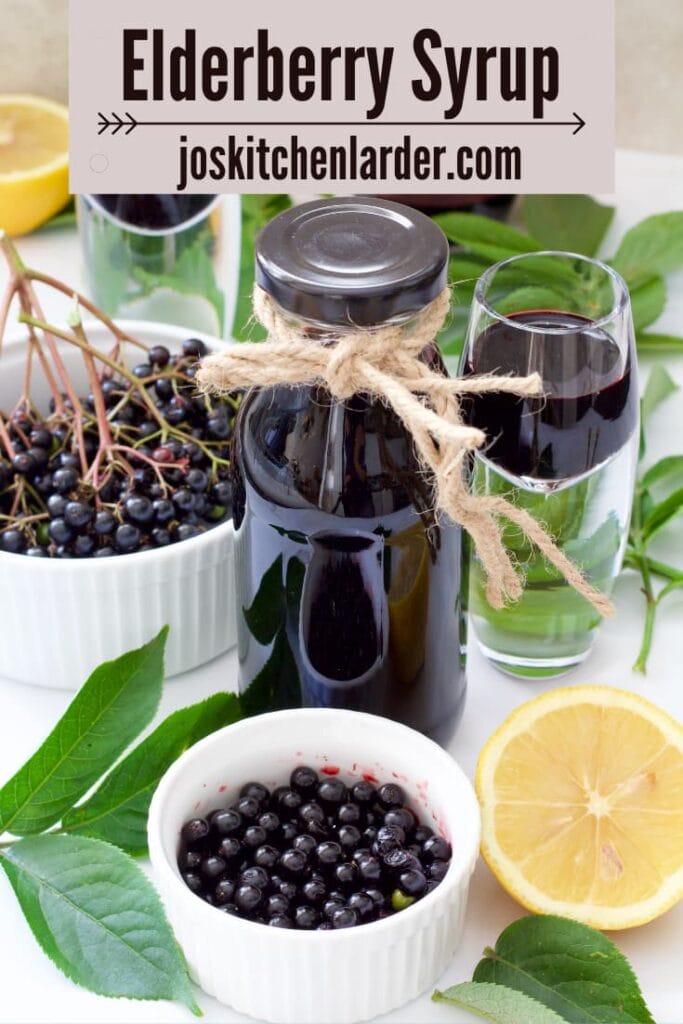
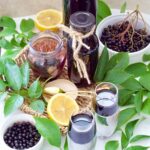
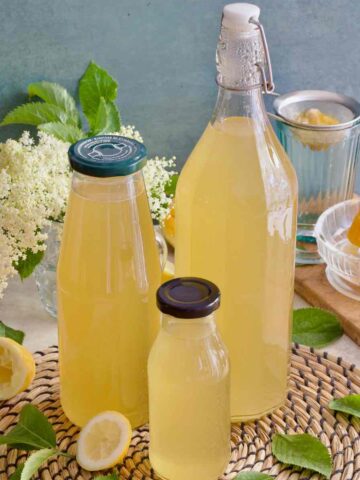
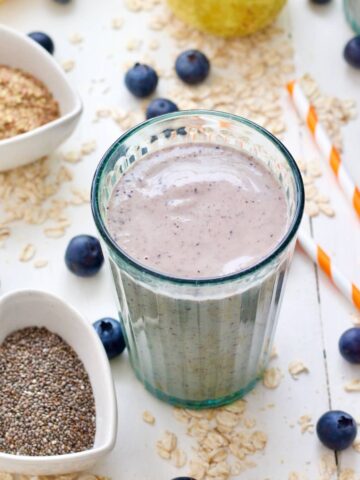
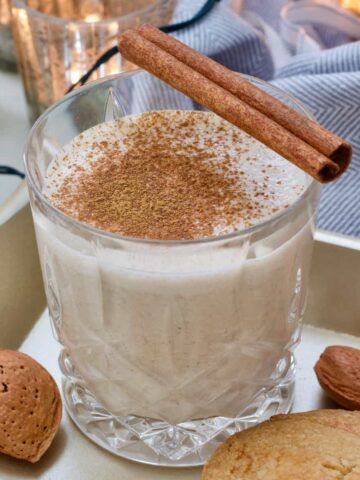
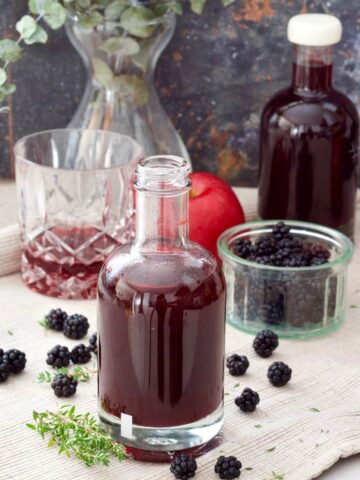
Juliet Wilkinson says
I made this today and it is amazing! Thank you so much!
joskitchenlarder says
So pleased to hear! 😊
Juliet Wilkinson says
Hi there! I just want to check this recipe is shelf stable with only lemon juice? And for how long. Thank you!
joskitchenlarder says
Hi Juliet, Yes it is shelf stable just with lemon juice and as long as you've used sterilised bottles/jars and stored in a cool dark place and away from direct sunlight it should last a few months. You can always keep it in the fridge if you'd like it to last even longer. Hope that helps.
Juliet says
Hi there.
First timer. I just boiled, simmered and strained the elderberries but the juice has a green hue. Does this mean I have to throw it all away? There weren’t any green ones but some of the berries when you squished then had a bit of green flesh inside.
Help!
joskitchenlarder says
Hello Juliet, In my experience fully ripe elderberries should not have green flesh inside and the juice should be deep dark purple colour which makes me think that perhaps some of the elderberries you've used weren't ripe. I'm not sure whether they could cause any harm post cooking but personally, I would err on the side of caution and not consume the syrup.
Victoria says
Can elderberries, after cleaning, be kept in the freezer until new batch of cordial is made?
joskitchenlarder says
Hi Victoria, Absolutely. Elderberries freeze really well and can be kept in the freezer until you are ready to make your next batch of syrup.
Rachel says
I made this syrup today it’s delicious thank you very much
joskitchenlarder says
So great to hear Rachel! 🙂
Amy says
Hi Jo, you have a different measurement of sugar at the start of your blog to the recipe...
joskitchenlarder says
Hi Amy,
It's the same amount of sugar 500g or 1.1lb or 17.6oz (depending which measurement you're using) per every 1 litre or 4.2 cups of strained juice. There was, however, a mistake with regards to the amount of strained juice in cups (in the little box at the start of the post) which I have now corrected.
Thank you so much for making me look at it again closely 🙂 x